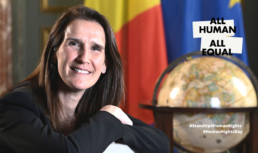On the occasion of International Human Rights Day, Deputy Prime Minister and Minister of Foreign Affairs Sophie Wilmès and Minister for Development Cooperation Meryame Kitir reiterate Belgium’s commitment to the protection and promotion of all human rights for everyone.
The principles of equality and non-discrimination are at the heart of human rights. Both Ministers therefore support the view of the UN High Commissioner for Human Rights, Michelle Bachelet : “This means that we accept our diversity and demand that everyone is treated without discrimination. ”
For Minister Wilmès, “human rights are part of our Belgian identity. The universality, indivisibility and interdependence of human rights, which are mutually reinforcing, are the fundamental principles of our action, both in our internal policies and on the international scene. Human rights are not a favour granted by states. They are an obligation for all, always. We protect and promote the inherent rights of all people, regardless of their race, religion or belief, gender, gender identity or sexual orientation.”
Unfortunately, the COVID-19 pandemic and its socio-economic consequences continue to challenge human rights and exacerbate pre-existing inequalities and discrimination. Democracy and the Rule of Law, economic and social rights, and civil and political rights are negatively affected in many countries. The pressure on women and people in vulnerable situations is increasing.
In this difficult context, Belgium will continue its strong commitment to human rights bilaterally, but also within the European Union and in international forums. For example, the efforts of Belgian diplomacy and development cooperation in favour of gender equality and the rights of women and girls have not wavered. Gender equality can only be achieved if sexual and reproductive rights are guaranteed, including access to sexual and reproductive health information and services. At the Generation Equality Forum, organised by UN Women in July 2021, our country has committed itself as a Pledge-holder for the coalition of action on gender-based violence and the coalition of action on bodily autonomy.
The Belgian commitment is also reflected in the choice of the Office of the United Nations High Commissioner for Human Rights (OHCHR) as a partner for Belgian development cooperation, with a contribution to its core budget of 2.5 million euro per year, as well as to four OHCHR country offices in Palestine, Guinea, Uganda and the DRC. Foreign Affairs provides additional financial support of almost EUR 1 million to the OHCHR’s Democracy and Rule of Law Section and to the project “Harnessing the Digital Potential for Human Rights”.
Minister Kitir: “Human rights and democracy are under severe pressure worldwide. We see this in our partner countries, but equally well closer to home. Democracy and human rights are not limited to fine words and the mere organisation of elections. They form the basis of a society, every day. Civil society plays a crucial role in protecting human rights. I will therefore continue to invest in civil society organisations that stand up for the protection and promotion of human rights and democracy, but also organisations that protect human rights activists. Because they are making the difference today.”
Belgium is therefore committed to cooperating with development partners in a number of partner countries who work to promote and protect the space for civil society, to protect human rights defenders and to implement the human rights commitments that countries have made internationally.
The Belgian Development Cooperation will support 8 projects in 3 partner countries (Uganda, Rwanda and Tanzania) that through their actions aim to protect the space for local civil society, promote civic participation – especially of disadvantaged and vulnerable groups – and strengthen transparency. More specifically, this concerns projects on the promotion of transparency in the mining sector (IPIS, Tanzania), of civic participation and freedom of expression (BBC Media, Tanzania), of the strengthening of civic participation of LGBTI communities, of the civic participation of female market vendors (APT, Uganda), strengthening of information and participation through radio campaigns (TRAC FM, Uganda), of women’s participation in dialogue and conflict (FAP, Burundi), of increased representation of rural populations (TRIAS, Burundi) and finally, of legal protection and strengthening of local civil society organisations (Avocats sans Frontières, Burundi, Uganda, Tanzania).
Furthermore, Belgian development cooperation will finance projects of specialised international NGOs for the protection of human rights defenders (NGO Defend Defenders in Uganda, with regional operations in East Africa/Horn of Africa) and NGO Protection International in DR Congo). In addition, one NGO (UPR Info) is also funded that works specifically on promoting the implementation of human rights commitments that countries have made internationally, with operations in some African countries, including partner countries Senegal and DR Congo.
Finally, Belgium also attaches great importance to the transversal integration of human rights principles in the interventions of Belgian actors by applying a holistic human rights approach.
